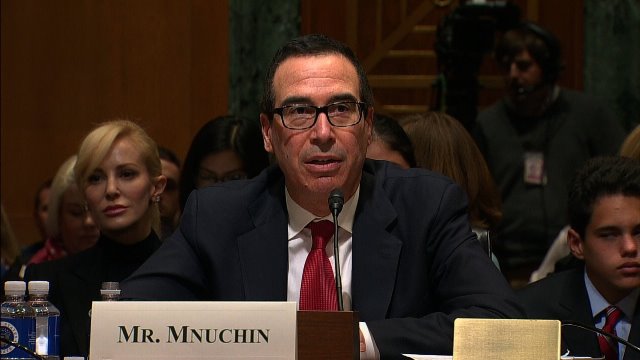Now that Steven Mnuchin has been confirmed as Treasury secretary, his top priority will have nothing to do with tax reform.
It will be to try and avert a debt ceiling crisis that could upend markets and cause financial chaos — unless Congress acts soon.
The debt ceiling is the country’s legal borrowing limit set by Congress. For years, lawmakers have fought over whether and by how much the ceiling should be increased.
When they can’t agree, they temporarily “suspend” it. And when the suspension ends the debt ceiling resets at the level where it was plus whatever Treasury borrowed in the suspension period.
On March 15, the latest suspension expires and the debt limit will likely reset a little north of $20 trillion.
If Congress has not voted by mid-March to either extend the suspension or raise the ceiling, Mnuchin will have to start using special accounting measures just to keep paying the country’s bills without violating the borrowing limit.
And that task will become increasingly treacherous as the so-called “X” date approaches.
The “X” date is when the special accounting measures are exhausted, at which point Treasury would only be able to pay bills with the revenue coming in. Since the federal government runs deficits every year, that revenue is never sufficient to cover all payments. That’s why the Treasury borrows in the first place, to make up the difference.
That’s why, contrary to what many conservatives like to say, raising the debt ceiling isn’t a “license to spend more.” It’s more like a license to continue paying what the country already owes.
Those obligations — approved over the years by both parties — include paying bondholders, federal contractors, Social Security recipients, tax filers owed refunds and a vast array of other parties.
If lawmakers don’t do something before the “X” date, the United States would default on some of its debts. That could push world markets into a tailspin and send interest rates soaring. It could ruin the sterling credit of the United States, and cause a lot of economic tumult. Not exactly what a Treasury secretary wants to happen on his watch.
Mnuchin will soon have to give lawmakers his best estimate of when the “X” date will be. The Bipartisan Policy Center, an outside think tank, calculates that the extraordinary measures could last through July, possibly a little longer.
While some lawmakers might want to use the debt ceiling debate to get what they want before they approve an increase, Mnuchin said during his confirmation hearing that he’d prefer to skip any drama.
“Honoring the U.S. debt is the most important thing. … I would like us to raise the debt ceiling sooner rather than later.”
He also might argue that the longer Congress delays, the more unnecessary costs the federal government will incur.
As past debt ceiling standoffs have shown, U.S. borrowing costs rise the closer to the “X” date Congress waits to act.
And forcing Treasury to use extraordinary accounting measures just to stay under the borrowing limit consumes a lot of federal employees’ time.
“It’s not an effective use of government resources,” said Shai Akabas, the Bipartisan Policy Center’s director of fiscal policy.
